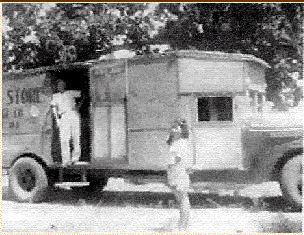Rolling Store
 Just a little bit of history. When the children would see the "Rolling Store” the cry would go up and down the road letting everyone know that the rolling store was coming and that you better come “quick’. The driver of the truck would be blowing his horn to get everyone’s attention. Everyone on the farms would be so excited because they knew they were going to get something off that Rolling Store or they were going to be able be see what they would wish for the next time he came through.
Just a little bit of history. When the children would see the "Rolling Store” the cry would go up and down the road letting everyone know that the rolling store was coming and that you better come “quick’. The driver of the truck would be blowing his horn to get everyone’s attention. Everyone on the farms would be so excited because they knew they were going to get something off that Rolling Store or they were going to be able be see what they would wish for the next time he came through.
In the past, rural areas in Arkansas were populated with families on small farms or they were sharecroppers or field laborers. Many of the farmers operated a commissary on their farms to insure the hands had the essential flour, cornmeal, soda, baking power, and salt meat. During these times, the Rolling Store merchants were fairly abundant throughout the state, sell ing their wares on dusty dirt roads through the countryside before World War II. While most people still made periodic trips to town for supplies, the rolling store was an added convenience to them and a necessity for those who were not able to get ¡n to town to shop. The store went through the countryside on Saturday’s in this area to take advantage of payday.
It was common for people who ran Rolling Stores to swap out merchandise for common farm goods such as eggs, chickens, pecans and maybe shelled corn or vegetables. The Rolling Store had cages attached to the truck to hold the chickens that were bartered for and soon to be sold further down the road. People tended to buy staples like flour, salt, baking powder, canned goods, pots and pans, kerosene, ‘drum” fish, and sewing needles. Hardware such as nails, screws, and tools were always carried and sold. Fresh meat was a real treat for them and was occasionally carried on the truck. One of the biggest treats was stick candy.
The “Rolling Store" provided a slice of life to those who could not get to the nearest town.
